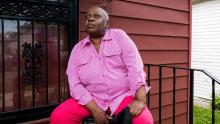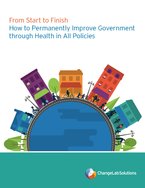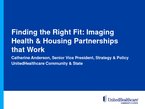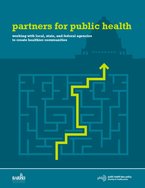0
Publication
Community:
Build success with effective enforcement. Someone who smokes where smoking is prohibited is violating the policy. Enforcement of the smoke-free policy is similar to enforcement of other building policies, like noise or pet restrictions. Be consistent, fair, positive, and pragmatic.
Authored by: Building Success
Topics: Health, Housing, Legislation & Policy, Smoke-free
 Shared by Housing Is
Shared by Housing Is
Housing Is posted a
on Feb 4, 2019
Build success with effective enforcement. Someone who smokes where smoking is prohibited is violating the policy. Enforcement of the smoke-free policy is similar to enforcement of other building policies, like noise or pet restrictions. Be consistent, fair, positive, and pragmatic.
0
Publication
Community:
Build success by helping smokers comply with the policy. Some residents who smoke may not be ready or able to stop smoking, but you can work with them to help them comply with the policy. Showing compassion to residents facing barriers to compliance may increase acceptance of the policy and willingness to comply.
Authored by: Building Success
Topics: Health, Housing, Legislation & Policy, Smoke-free
 Shared by Housing Is
Shared by Housing Is
Housing Is posted a
on Feb 4, 2019
Build success by helping smokers comply with the policy. Some residents who smoke may not be ready or able to stop smoking, but you can work with them to help them comply with the policy.
0
Publication
Community:
Build success by supporting cessation among smokers for whom a smoke-free housing policy may provide motivation to quit.
Authored by: Building Success
Topics: Health, Housing, Legislation & Policy, Smoke-free
 Shared by Housing Is
Shared by Housing Is
Housing Is posted a
on Feb 4, 2019
Build success by supporting cessation among smokers for whom a smoke-free housing policy may provide motivation to quit.
0
Publication
Community:
Build success by partnering with local agencies and organizations. Community partners can advise during planning, education residents during implementation, and help support cessation.
Authored by: Building Success
Topics: Health, Housing, Legislation & Policy, Partnerships, Smoke-free
 Shared by Housing Is
Shared by Housing Is
Housing Is posted a
on Feb 4, 2019
Build success by partnering with local agencies and organizations. Community partners can advise during planning, education residents during implementation, and help support cessation.
0
Publication
Community:
Build success by training staff on how to effectively share information about the policy and the importance of consistent enforcement.
Authored by: Building Success
Topics: Health, Housing, Legislation & Policy, Smoke-free
 Shared by Housing Is
Shared by Housing Is
Housing Is posted a
on Feb 4, 2019
Build success by training staff on how to effectively share information about the policy and the importance of consistent enforcement.
0
Publication
Community:
Build Success by engaging residents. Residents can be a strong asset in planning, communication, implementation, and compliance efforts.
Authored by: Building Success
Topics: Health, Housing, Legislation & Policy, Place-based, Smoke-free
 Shared by Housing Is
Shared by Housing Is
Housing Is posted a
on Feb 4, 2019
Build Success by engaging residents. Residents can be a strong asset in planning, communication, implementation, and compliance efforts.
0
Publication
Community:
Jan 7, 2019
Times are changing rapidly for families—our households, work and the workforce do not look like they did just a decade ago. Challenges and barriers for parents continue to grow – skyrocketing costs of health care and child care, lack of flexibility at the workplace, and less time at home. Working parents have to balance their budget and time across an ever-changing landscape of needs: from caring for themselves, their children, and older family members, to affording quality child care and paying household bills. Removing barriers so families can care for their loved ones requires us to rethink and update the supports in place for working parents to keep up with the realities of a changing workforce.
Authored by: Lindsay Broyhill for Ascend: The Aspen Institute
Topics: Child welfare, Dual-generation, Early childhood, Family engagement, Health, Legislation & Policy, Low-income, Preventative care
 Shared by Mica O'Brien
Shared by Mica O'Brien
Mica O'Brien posted a
on Jan 31, 2019
Lindsay Broyhill for Ascend: The Aspen Institute
Times are changing rapidly for families—our households, work and the workforce do not look like they did just a decade ago. Challenges and barriers for parents continue to grow – skyrocketing costs of health care and child care, lack of flexibility at the workplace, and less time at home.
0
Interactive
Community:
Jan 30, 2019
Medicaid helps low-income seniors, children, people with disabilities, and families get needed health care. Medicaid coverage improves families’ financial security by protecting them from medical debt and helping them stay healthy for work. Medicaid coverage also has long-term health, educational, and financial benefits for children. Click on the map to learn more about Medicaid’s contributions to your state.
Authored by: Matt Broaddus for the Center on Budget and Policy Priorities
Topics: Child welfare, Health, Legislation & Policy, Low-income, Medicaid / Medicare, Research
 Shared by Housing Is
Shared by Housing Is
Housing Is posted a
on Jan 30, 2019
Matt Broaddus for the Center on Budget and Policy Priorities
Medicaid helps low-income seniors, children, people with disabilities, and families get needed health care. Medicaid coverage improves families’ financial security by protecting them from medical debt and helping them stay healthy for work.
0
News Article
Community:
Jan 25, 2019
A whole host of factors — such as friends, housing and transportation — affect a person’s health and how much they need the social safety net. It’s time the government’s big health insurance programs took this reality into account, some lawmakers and policymakers are starting to argue.
Authored by: Paige Winfield Cunningham for The Washington Post
Topics: Asset building, Cost effectiveness, Disabilities, Education, Food insecurity, Funding, Health, Homelessness, Housing, Legislation & Policy, Low-income, Medicaid / Medicare, Seniors, Transportation, Workforce development
 Shared by Housing Is
Shared by Housing Is
Housing Is posted a
on Jan 25, 2019
Paige Winfield Cunningham for The Washington Post
A whole host of factors — such as friends, housing and transportation — affect a person’s health and how much they need the social safety net. It’s time the government’s big health insurance programs took this reality into account, some lawmakers and policymakers are starting to argue.
0
Publication
Community:
Jan 24, 2019
Affordable housing campaigns are not new, of course, but what is unprecedented and transformative about Opportunity Starts at Home is the scope and diversity of the partners that are joining forces to advocate for more robust and equitable federal housing policies. The campaign is advised by a Steering Committee including leading national organizations representing a wide range of interests that are working shoulder-to-shoulder to solve the affordable housing crisis.
Authored by: Opportunity Starts at Home
Topics: Asset building, Child welfare, CLPHA, Community development, Early childhood, Education, Food insecurity, Funding, Health, Homelessness, Housing, Immigrants, Legislation & Policy, Low-income, Mobility, Out-of-school time, Partnerships, Racial inequalities, Safety, Seniors, Stability, Substance abuse, Youth
 Shared by Mica O'Brien
Shared by Mica O'Brien
Mica O'Brien posted a
on Jan 24, 2019
Opportunity Starts at Home
Affordable housing campaigns are not new, of course, but what is unprecedented and transformative about Opportunity Starts at Home is the scope and diversity of the partners that are joining forces to advocate for more robust and equitable federal housing policies.
0
Publication
Community:
Dec 17, 2018
In response to the heightened interest in the relationship between work and the health of individuals and communities, CMCS has clarified that Medicaid funds cannot be used to pay beneficiaries’ wages, but can pay for employment counseling as an optional benefit—to help people get jobs. Years of experience with work requirements for the Supplemental Nutrition Assistance Program, Aid to Families with Dependent Children, and populations with disabilities have developed the evidence for what is needed to help different populations find and keep jobs.
Authored by: Christopher F. Koller for Millbank Memorial Fund
Topics: Affordable Care Act, Disabilities, Health, Legislation & Policy, Low-income, Medicaid / Medicare, Research, Stability, Workforce development
 Shared by Mica O'Brien
Shared by Mica O'Brien
Mica O'Brien posted a
on Dec 17, 2018
Christopher F. Koller for Millbank Memorial Fund
In response to the heightened interest in the relationship between work and the health of individuals and communities, CMCS has clarified that Medicaid funds cannot be used to pay beneficiaries’ wages, but can pay for employment counseling as an optional benefit—to help people get jobs.
0
Publication
Community:
Dec 14, 2018
Health and reentry are closely related, and chronic medical, mental health, and substance use problems make it harder for newly released people to seek employment, obtain housing, and avoid reincarceration. Compared with the general population, justice-involved people tend to be in poorer health and need access to physical and behavioral health services, as well as the know-how and motivation to get care.
Authored by: Rochisa Shukla and Kamala Mallik-Kane for Urban Institute
Topics: Affordable Care Act, Criminal justice, Health, Legislation & Policy, Low-income, Medicaid / Medicare, Research, Stability
 Shared by Mica O'Brien
Shared by Mica O'Brien
Mica O'Brien posted a
on Dec 14, 2018
Rochisa Shukla and Kamala Mallik-Kane for Urban Institute
Health and reentry are closely related, and chronic medical, mental health, and substance use problems make it harder for newly released people to seek employment, obtain housing, and avoid reincarceration.
0
Publication
Community:
Dec 6, 2018
The administration has proposed an expansion of the “public charge” rule that would make it more difficult for applicants whom officials deem likely to rely on public assistance to obtain lawful permanent residence (a “green card”) or a temporary visa. Among other changes, the rule would expand public charge determinations to include an applicant’s enrollment in the Medicaid program. Adding Medicaid to the list of public charge benefits that would be considered may force immigrants to choose between health insurance coverage and a future green card—with adverse consequences for parents and their children.
Authored by: Emily M. Johnston, Genevieve M. Kenney, and Jennifer M. Haley for The Urban Institute
Topics: Affordable Care Act, Health, Housing, Immigrants, Legislation & Policy, Medicaid / Medicare, Safety
 Shared by Mica O'Brien
Shared by Mica O'Brien
Mica O'Brien posted a
on Dec 6, 2018
Emily M. Johnston, Genevieve M. Kenney, and Jennifer M. Haley for The Urban Institute
The administration has proposed an expansion of the “public charge” rule that would make it more difficult for applicants whom officials deem likely to rely on public assistance to obtain lawful permanent residence (a “green card”) or a temporary visa.
0
News Article
Community:
Nov 14, 2018
HHS Secretary Alex Azar on Wednesday said Medicaid may soon allow hospitals and health systems to directly pay for housing, healthy food or other solutions for the "whole person."
Authored by: Paul Barr and Virgil Dickson for Modern Healthcare
Topics: Health, Housing, Legislation & Policy, Medicaid / Medicare, Mental health, Preventative care
 Shared by Mica O'Brien
Shared by Mica O'Brien
Mica O'Brien posted a
on Nov 15, 2018
Paul Barr and Virgil Dickson for Modern Healthcare
HHS Secretary Alex Azar on Wednesday said Medicaid may soon allow hospitals and health systems to directly pay for housing, healthy food or other solutions for the "whole person."
1
News Article
Community:
Sep 11, 2018
San Francisco health officials working to end HIV infections and deaths in The City are zeroing in on the homeless population, where there’s been an uptick in new cases.
Authored by: Joshua Sabatini for
Topics: Health, Homelessness, Legislation & Policy, Low-income, Preventative care, West Coast
 Shared by Mica O'Brien
Shared by Mica O'Brien
Mica O'Brien posted a
on Sep 18, 2018
San Francisco health officials working to end HIV infections and deaths in The City are zeroing in on the homeless population, where there’s been an uptick in new cases.
0
Interactive
Community:
Sep 18, 2018
Understanding the characteristics of infants and toddlers in our states and communities is an important first step for supporting children’s development during their most critical years. Making more detailed and comprehensive information available on the young children living in different communities can help stakeholders more strategically develop and target key services such as child care, home visiting, or other services for young children. For example, knowing how many young children live in low-income families and what share have parents working full time can help states and localities tailor child care investments and services to reach those families who most need assistance.
Authored by: Cara Lou and Gina Adams for Urban Institute
Topics: Early childhood, East Coast, Health, Legislation & Policy, Midwest, South, West Coast
 Shared by Mica O'Brien
Shared by Mica O'Brien
Mica O'Brien posted a
on Sep 18, 2018
Cara Lou and Gina Adams for Urban Institute
Understanding the characteristics of infants and toddlers in our states and communities is an important first step for supporting children’s development during their most critical years.
0
Publication
Community:
Jul 18, 2018
Health in All Policies is a collaborative approach to improving the health of a community by incorporating health, sustainability, and equity considerations into decision-making across sectors and policy areas. One of the key objectives of Health in All Policies is to create lasting change in government structures and processes.
Authored by:
Topics: Community development, Health, Legislation & Policy, Partnerships, Preventative care
 Shared by Housing Is
Shared by Housing Is
Housing Is posted a
on Jul 18, 2018
Health in All Policies is a collaborative approach to improving the health of a community by incorporating health, sustainability, and equity considerations into decision-making across sectors and policy areas.
0
Publication
Community:
Jul 13, 2018
Authored by:
Topics: CLPHA, Data sharing, Health, Housing, Legislation & Policy, Low-income, Medicaid / Medicare, Partnerships, Preventative care, Research
 Shared by Housing Is
Shared by Housing Is
Housing Is posted a
on Jul 13, 2018
0
Publication
Community:
Jul 13, 2018
This guide is intended to provide information to public health department staff and advocates about the many public agencies that make policy decisions and implement projects related to the physical environment.
Authored by:
Topics: Child welfare, Community development, Education, Exercise, Green, Health, Housing, Legislation & Policy, Place-based, Safety, Smoke-free, Stability, Substance abuse, West Coast
 Shared by Housing Is
Shared by Housing Is
Housing Is posted a
on Jul 13, 2018
This guide is intended to provide information to public health department staff and advocates about the many public agencies that make policy decisions and implement projects related to the physical environment.
0
Publication
Community:
Jul 12, 2018
This brief aims to bring attention to non-Medicaid funding sources that states could potentially blend or braid to address social determinants of health and other needs that are not typically covered by Medicaid. It is intended to familiarize state Medicaid, public health, and other state policymakers with the funding streams of other agencies, and sketch out a continuum of options to help states coordinate funding to better serve the needs of low-income populations. Because this brief focuses on services for adult Medicaid beneficiaries, it does not address many of the funding sources available for children’s services. However, existing efforts to pool funds for children and youth—notably by the Commonwealth of Virginia—could prove instructive for states seeking to launch such an effort for adults.
Authored by:
Topics: Cost effectiveness, Data sharing, Dual-eligibles, Food insecurity, Funding, Health, Homelessness, Housing, Legislation & Policy, Low-income, Medicaid / Medicare, Mental health, Partnerships, Research, Substance abuse
 Shared by Housing Is
Shared by Housing Is
Housing Is posted a
on Jul 12, 2018
This brief aims to bring attention to non-Medicaid funding sources that states could potentially blend or braid to address social determinants of health and other needs that are not typically covered by Medicaid.
0
Publication
Community:
Jul 12, 2018
This report examines four specific aspects of the challenge before us:
• The need for a much greater supply of homes affordable to our nation’s lowest-income seniors.
• The importance of transforming homes and communities so that seniors can age with options, a desire shared by the overwhelming majority of older adults.
• The imperative to better integrate health care and supportive services with housing, recognizing that this integration has the potential to improve health outcomes for seniors and reduce the costs borne by the health care system.
• The need to deploy technologies on a far wider scale to help all Americans age successfully.
Authored by:
Topics: Cost effectiveness, Funding, Health, Home visiting, Homelessness, Housing, Legislation & Policy, Low-income, Medicaid / Medicare, Partnerships, Place-based, Preventative care, Seniors, Supportive housing
 Shared by Housing Is
Shared by Housing Is
Housing Is posted a
on Jul 12, 2018
This report examines four specific aspects of the challenge before us:
• The need for a much greater supply of homes affordable to our nation’s lowest-income seniors.
• The importance of transforming homes and communities so that seniors can age with options, a desire shared by the overwhelming ma
0
News Article
Community:
Jul 9, 2018
Neighborhood may matter more than race in breast cancer survival rates
Authored by: Darcel Rockett for THE CHICAGO TRIBUNE
Topics: Health, Legislation & Policy, Low-income, Medicaid / Medicare, Midwest, Racial inequalities
 Shared by Abra Lyons-Warren
Shared by Abra Lyons-Warren
Abra Lyons-Warren posted a
on Jul 12, 2018
Darcel Rockett for THE CHICAGO TRIBUNE
Neighborhood may matter more than race in breast cancer survival rates
0
News Article
Community:
Aug 1, 2016
Boulder County, Colo., pioneered the movement. What can others learn from their experience?
Authored by: Mattie Quinn for Governing the State and Localities
Topics: Cost effectiveness, Data sharing, Dual-eligibles, Food insecurity, Health, Homelessness, Housing, Legislation & Policy, Low-income, Medicaid / Medicare, Partnerships, Place-based, Supportive housing, West Coast
 Shared by Housing Is
Shared by Housing Is
Housing Is posted a
on Jul 5, 2018
Mattie Quinn for Governing the State and Localities
Boulder County, Colo., pioneered the movement. What can others learn from their experience?
2
News Article
Community:
Mar 2, 2017
Dr. Ben Carson becomes HUD Secretary with 58 to 41 vote in the Senate
Authored by:
Topics: Affordable Care Act, Funding, Health, Housing, Legislation & Policy
 Shared by Steve Lucas
Shared by Steve Lucas
Steve Lucas posted a
on Mar 2, 2017
On March 2, 2017 the U.S. Senate confirmed the nomination of Dr. Benjamin S. Carson, Sr. as the 17th Secretary of the U.S. Department of Housing and Urban Development by a 58 to 41 vote. Dr. Carson’s confirmation followed a relatively non-controversial nomination hearing in January and a straight-forward procedural vote in late February that advanced his nomination to the Senate floor.
Dr. Ben Carson becomes HUD Secretary with 58 to 41 vote in the Senate
 Shared by Housing Is
on Feb 4, 2019
Shared by Housing Is
on Feb 4, 2019
 Shared by Housing Is
on Feb 4, 2019
Shared by Housing Is
on Feb 4, 2019
 Shared by Housing Is
on Feb 4, 2019
Shared by Housing Is
on Feb 4, 2019
 Shared by Housing Is
on Feb 4, 2019
Shared by Housing Is
on Feb 4, 2019
 Shared by Housing Is
on Feb 4, 2019
Shared by Housing Is
on Feb 4, 2019
 Shared by Housing Is
on Feb 4, 2019
Shared by Housing Is
on Feb 4, 2019
 Shared by Housing Is
on Jan 30, 2019
Shared by Housing Is
on Jan 30, 2019
 Shared by Housing Is
on Jan 25, 2019
Shared by Housing Is
on Jan 25, 2019




 Shared by Housing Is
on Jul 18, 2018
Shared by Housing Is
on Jul 18, 2018
 Shared by Housing Is
on Jul 13, 2018
Shared by Housing Is
on Jul 13, 2018
 Shared by Housing Is
on Jul 13, 2018
Shared by Housing Is
on Jul 13, 2018
 Shared by Housing Is
on Jul 12, 2018
Shared by Housing Is
on Jul 12, 2018
 Shared by Housing Is
on Jul 12, 2018
Shared by Housing Is
on Jul 12, 2018

 Shared by Abra Lyons-Warren
on Jul 12, 2018
Shared by Abra Lyons-Warren
on Jul 12, 2018

 Shared by Housing Is
on Jul 5, 2018
Shared by Housing Is
on Jul 5, 2018

 Shared by Steve Lucas
on Mar 2, 2017
Shared by Steve Lucas
on Mar 2, 2017









